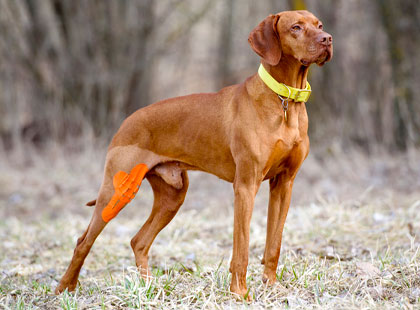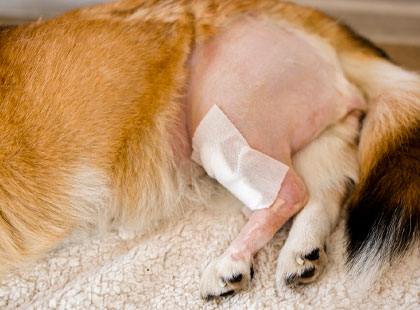Yucca Veterinary Medical Center
Orthopedics Services
Yucca Veterinary Medical Center TPLO Surgery
A torn cruciate ligament, also known as a torn ACL (anterior cruciate ligament), is a common orthopedic injury seen in dogs. The cruciate ligaments are located inside the knee joint and are responsible for providing stability and preventing excessive forward or backward movement of the joint. When a dog experiences a torn cruciate ligament, it can be a painful and debilitating condition.
 The most common cause of a torn cruciate ligament in dogs is sudden twisting or pivoting movements during physical activity, such as running or playing. Large and active breeds are more prone to this injury, although it can affect dogs of any size. Symptoms of a torn cruciate ligament may include lameness, swelling, stiffness, and reluctance to put weight on the affected leg.
The most common cause of a torn cruciate ligament in dogs is sudden twisting or pivoting movements during physical activity, such as running or playing. Large and active breeds are more prone to this injury, although it can affect dogs of any size. Symptoms of a torn cruciate ligament may include lameness, swelling, stiffness, and reluctance to put weight on the affected leg.
Treatment options for a torn cruciate ligament in dogs vary depending on the severity of the injury and the size and activity level of the dog. Conservative management can involve rest, anti-inflammatory medications, and physical therapy to help strengthen the surrounding muscles. However, surgical intervention is often recommended for larger dogs or cases where conservative management does not provide sufficient relief.
TPLO (Tibial Plateau Leveling Osteotomy) surgery is a common orthopedic procedure performed on dogs to address this condition and give your pet their comfort and control back.
During a TPLO surgery, Dr. Sanchez makes an incision near the dog's knee joint to access the tibia (shinbone). The surgeon then cuts the tibia and reorients the bone by leveling the tibial plateau, which is the sloped area where the femur (thighbone) meets the tibia. This realignment helps stabilize the knee joint and compensate for the damaged or torn CCL.
The procedure typically involves the following steps:

- Examination and Pre-surgical Planning: Dr. Sanchez will conduct a thorough examination, which may include X-rays or other imaging techniques, to assess the extent of the CCL injury and determine if TPLO surgery is appropriate for the dog.
- Anesthesia: The dog will be placed under general anesthesia to ensure it remains pain-free and immobile during the procedure.
- Incision and Joint Access: Dr. Sanchez will make an incision on the side of the knee to expose the joint and gain access to the tibia.
- Bone Cutting: Dr. Sanchez will carefully cut the tibia using specialized equipment to create a circular or semicircular bone cut. This cut changes the alignment of the tibia and levels the tibial plateau.
- Plate and Screw Placement: A metal bone plate is fixed to the tibia using screws to maintain the new position of the bone. The plate and screws provide stability during the healing process.
- Closure: The incision is sutured, and the surgical site is carefully cleaned to reduce the risk of infection.
Recovery from TPLO surgery requires strict post-operative care, which may involve pain management, restricted activity, physical therapy, and follow-up appointments with the veterinarian. The timeline for recovery can vary depending on the dog's size, age, overall health, and the severity of the initial injury.
It is important to consult Dr. Sanchez of Yucca Veterinary Medical Center who can assess your dog's specific condition, provide an accurate diagnosis, and recommend the most suitable treatment options, which may include TPLO surgery.

